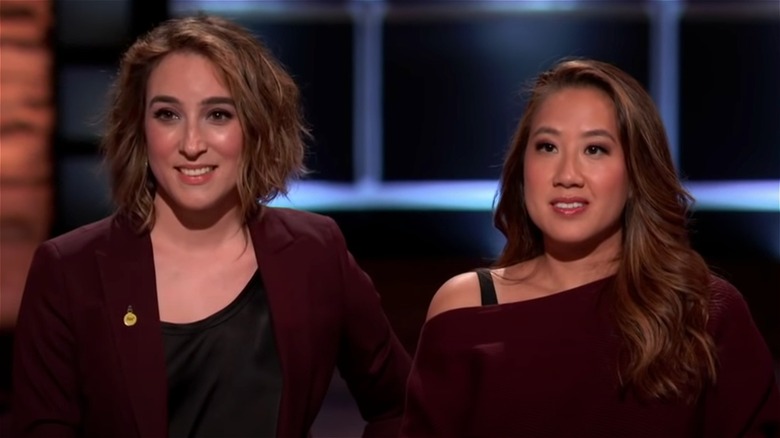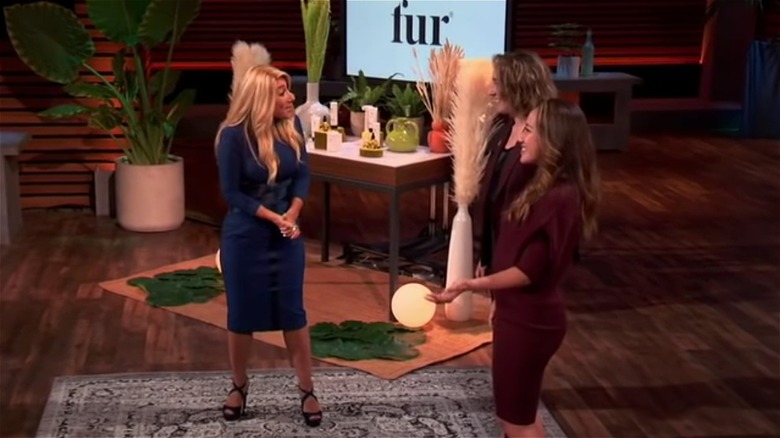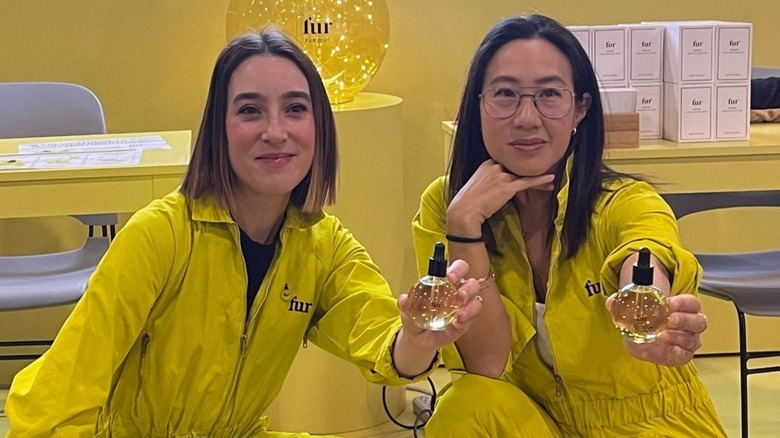What Happened To Fur After Shark Tank?
Fur founders Laura Schubert and Lillian Tung visited "Shark Tank" in early 2020 to pitch their line of intimate hair care products, including Fur Oil, a luxurious body oil made of grape seed, jojoba, clary sage, and tea tree oils that softens and prevents ingrown hairs. But aside from getting the sharks to say the word "pubic" probably more times than they ever had on the ABC investment show, Fur's time on "Shark Tank" proved hairier than they might've expected.
Although the sharks were initially receptive — how could you not be when the Fur founders brought in sheep to demonstrate their products' effect on coarse, curly hair? — things got a bit frizzy when the brand asked for $500,000 in exchange for 2.5% equity. No shark was willing to take that bait. As the Fur founders stood firm on their original offer, it caused some investors like Daymond John to renege his investment offer entirely, citing professional incompatibility.
Ultimately, Schubert and Tung compromised with the "Queen of QVC" shark Lori Greiner for a $500,000 investment in exchange for 8% equity and a $50,000 donation toward an organization promoting body positivity (via YouTube). Since its time on "Shark Tank," the Fur brand has remained committed to carving a space out in the intimate care market to normalize the presence and maintenance of pubic hair.
Combing through Fur's progress after their ABC appearance
Fur's acceptance of "Shark Tank" investor Lori Greiner's offer seemed to offer a sigh of relief following a tense stand-off between founders Laura Schubert and Lillian Tung and the sharks. However, Greiner's deal was never implemented, and neither the brand nor investor have publicly disclosed the reason for the fallout, per Innovationify. Nevertheless, long-time friends and Harvard classmates Schubert and Tung haven't given up on their brand.
The founders used their initial "Shark Tank" success to leverage product placement in major retailers like Neiman Marcus, Free People, Goop, Amazon, Urban Outfitters, and Ulta. Innovationify reports that Fur boasts a net worth of around $30 million as of 2023, with approximately $5 million in annual sales. A small employee pool of about 11 to 50 individuals currently runs the multi-million dollar company, per Fur's LinkedIn profile. Indeed, the company's small size and discretion toward brand-altering investors allows Fur to stay true to its initial mission: desexualizing and normalizing pubic hair care.
"When we first started Fur, many industry veterans advised us to remove the word pubic from the packaging," co-founder Tung shared in a Three Ships Beauty interview. "When big retailers, editors, and industry experts tell you this, it's hard not to consider it, but I'm so glad we stood up for ourselves, as there's nothing to be ashamed of." Schubert echoed similar sentiments in a Coveteur interview: "Our whole brand is to make people comfortable with their bodies."
Looking ahead at the future of Fur
After Fur's 2017 celebrity endorsement by Emma Watson in an Into the Gloss piece and its 2020 "Shark Tank" appearance, the company is still in business and steadily moving forward. Fur has expanded its catalog to include body scrubs, trimmers, ingrown deodorants, serums, body butter, and more. In addition to its website and third-party retailers, Fur actively pushes new and existing products on its social media, with over 100,000 followers on Instagram and 10,000 followers on Facebook.
Fur co-founder Lillian Tung credits Fur's success despite setbacks to the brand's omnichannel marketing. "It's so important to be in places where everybody is thinking and shopping and has the ability to get to it," she told Entrepreneur. "And if you were to look at our revenue breakdown, we're very evenly split across all of our partnerships and our channels — that's so important because, in this day and age, people shop everywhere all the time."
The intimate hair care line has come a long way from its dud "Shark Tank" deal and getting rejected by retailers because of Fur's use of the word "pubic" on its products. But co-founder Laura Schubert told Entrepreneur that's just how she wants it. "Being a mission-based brand, [removing the word pubic] was something that we could never do. This is what we're here to do: to encourage conversations around pubic hair and body hair."


